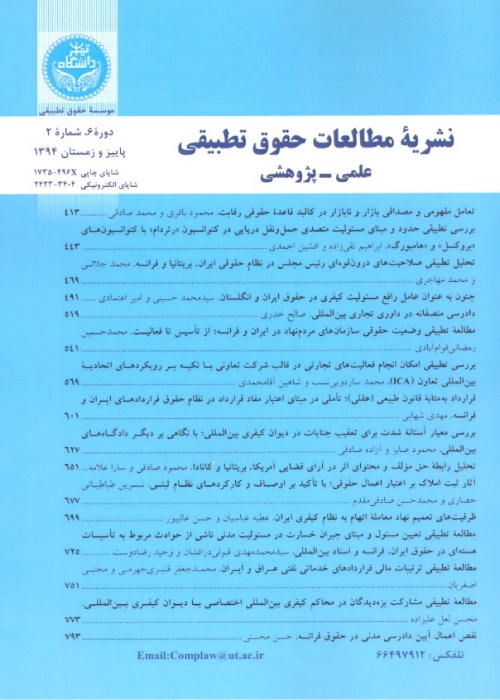Analytical Investigation of Non Liquet in Iran's Legal System and International Law; with Special emphasis on its Solutions
Author(s):
Article Type:
Research/Original Article (دارای رتبه معتبر)
Abstract:
It is impossible to legislate for every feasible situation. Therefore, in all legal systems there are silences and gaps, issues and matters as to which it seems to regulate. This is also true of the Iran’s legal system, and perhaps particularly true of the international legal system due to the slow legislative process and its normative and institutional weaknesses. This paper provides an analytical framework to develop a comprehensive understanding of non liquet in both systems, with an emphasis on the range of possible solutions. The author is of the opinion that, rather than being a complicated issue, non liquet and its solutions which have significant consequences for any legal system, goes back to the very heart of our understanding of that legal system.In Iranian legal system which is based on Islamic jurisprudence (figh), the Islamic Consultative Assembly (the legislator) has not only enacted general principles and rules in order to fill gaps in the system, but also on the adoption of reference to authoritative Islamic sources or authentic fatawa and legal principles that are not contrary to the Shari’ah, the judge has to deliver his judgment and settle disputes based on sources other than the law. But in the international legal system, it is necessary to distinguish between two issues. The International Court of Justice cannot refrain from delivering judgments in contentious cases. By resorting to the source-based (general principles of laws, equity, Martens Clause and the residual principle), or method-based approach (analogy, a contrario reasoning) the ICJ can take steps to avoid non liquet. However, in advisory proceedings, it is possible to face non liquet without being necessary to fill it. As a result, the court shall not be held to be in denial of justice and convicted, even by making a non liquet declaration to the effect that the law is non-existent or unclear on a particular issue.
Keywords:
Language:
Persian
Published:
Comparative Law Review, Volume:14 Issue: 2, 2024
Pages:
655 to 677
magiran.com/p2686403
دانلود و مطالعه متن این مقاله با یکی از روشهای زیر امکان پذیر است:
اشتراک شخصی
با عضویت و پرداخت آنلاین حق اشتراک یکساله به مبلغ 1,390,000ريال میتوانید 70 عنوان مطلب دانلود کنید!
اشتراک سازمانی
به کتابخانه دانشگاه یا محل کار خود پیشنهاد کنید تا اشتراک سازمانی این پایگاه را برای دسترسی نامحدود همه کاربران به متن مطالب تهیه نمایند!
توجه!
- حق عضویت دریافتی صرف حمایت از نشریات عضو و نگهداری، تکمیل و توسعه مگیران میشود.
- پرداخت حق اشتراک و دانلود مقالات اجازه بازنشر آن در سایر رسانههای چاپی و دیجیتال را به کاربر نمیدهد.
In order to view content subscription is required
Personal subscription
Subscribe magiran.com for 70 € euros via PayPal and download 70 articles during a year.
Organization subscription
Please contact us to subscribe your university or library for unlimited access!


